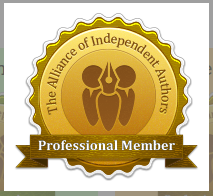|
I'm delighted to welcome my good friend, crime writer Tony Forder, to my blog today! It's been over two years since we last chatted here (see link: Interview with Tony Forder) so I thought it was time to catch up with Tony and his writing. Let's get started! 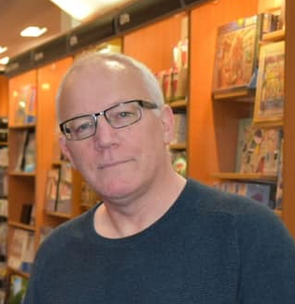 I’d like to know more about your latest novel. What can readers expect to encounter in its pages? Darker Days to Come is the ninth full-length novel in my DI Bliss series. As with most of my books, I hope readers will find the storyline complex and entertaining, intriguing and compelling, with characters they can genuinely believe in. It’s a strange twist of fate that leads Bliss and his team to the crimes committed here, and from the little kernels if information scattered around none of them expect the cases to grow in the way they do, nor take the paths they have to follow. The subject matter is disturbing at times, but I hope I’ve handled it sensitively. Any news or hints about your next novel? I’m in the throes of writing two, waiting for one to really take hold. Ideally, I would have finished my second DS Chase novel, The Predators, first, but I seem to be preferring the next Bliss, The Lightning Rod, so currently I have no idea which of these will be published next. Tell us about yourself and what you get up to when you’re not writing. Having moved earlier this year I’m enjoying settling into village life and creating a new home. I enjoy football and rugby, I’m a bit of a movie buff, but probably my biggest passion is music. I listen to music every day, and having played guitar since I was about the age of 10, I still get some practice in several days a week. I keep my guitars – all 4 of them – in my office, so when I need to take a break from writing I slide over in my chair and get my fingers working in a very different way. Who is your favourite novelist? At one time the answer would most definitely have been Stephen King. His imagination and ability to write creatively are on a par with the very best. These days, and since the early noughties, it’s Michael Connelly, best known for his Harry Bosch character. He's the king of crime in my view. 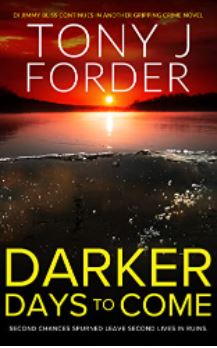 Do you have a special time to write? A writing routine? When writing a first draft I work 6-8 hours a day, 5 days a week if at all possible. My style is to get the story out of my head in that draft. The edit is where the book comes alive, and when I’m doing the first structural edit I work the same hours. With each edit I spend less time per day on the task, as I find myself scanning rather than reading accurately. Your mind plays tricks and fills in the gaps to the point where you ‘read’ missing words and your brain autocorrects typos without you noticing them. Where do your ideas come from? I wish I knew. In truth, they come from anywhere. My book Fifteen Coffins grew from that title, which popped into my head for no apparent reason. I have written storylines based on real cases – an interesting unsolved case in the US became the source of my Bliss novel, The Death of Justice. As ideas occur, I make notes. Those notes go into an ideas book, and every so often I go through each page, adding or subtracting, until hopefully one of them will do the trick for me. Last year I was struggling, and in a 30 minute spell I sat down and plucked 4 storylines from out of nowhere. One of them went on to become Darker Days to Come, and another will be The Lightning Rod, the next Bliss book. If I do use real-life, I tend to put my own spin on it, coming at it from a different perspective. What book are you reading at present? I just finished Jaws. It’s the first time I’ve read it in a couple of decades, but I remember it well from when it first came out. It’s one of only 2 books I’ve read in a single sitting – the other being King’s The Shining. Jaws didn’t quite live up to my memory of it, and the film got in the way to a certain extent. So yes, it’s dated, but in its time it was amazing. What kind of research do you do? in a word... exhaustive. I use only a fraction of what I learn, but I’m keen to be as authentic and knowledgeable as I can be. As a crime writer you have to research not just police procedure but also some pretty grisly stuff. I’ve learned more about how to practice taxidermy on humans than I ever wanted to know, also the gruesome practice of necklacing – a flaming tyre wrapped around the neck – and numerous awful things human being are capable of inflicting on others. Who’s your favourite fictional bad guy/gal? Hannibal Lecter. It’s 41 years since his first appearance in Red Dragon, and even as a bit-part character in that you got a sense of his magnetism. Seven years later, Silence of the Lambs was published, and in my view Lecter remains the psycho by which all subsequent psychos are judged. A learned, brilliant academic with primitive urges. Where do you see your writing career being in five years’ time? Well, by then I will have had to retire DI Jimmy Bliss. Whether I continue with him as a more peripheral character in a spin-off series or simply allow him to go gentle into that good night, I don’t know. Perhaps when I put him away for good, I can focus more clearly on other things. In terms of readership and status I’ve probably peaked, but I have a dedicated following who for the most part enjoy my other works. I do want to write at least 2 more DS Chase books, plus the third and final volume in my Mike Lynch action-adventure series. There’ll be no change of style or genre, but perhaps a few more standalones. Frankly, I just hope I am still writing in 2027. Thank you, Tony! Readers, you can find out more about Tony and his books below. Tony J Forder is the author of the bestselling DI Bliss crime thriller series. The first seven books, Bad to the Bone, The Scent of Guilt, If Fear Wins, The Reach of Shadows, The Death of Justice, Endless Silent Scream, and Slow Slicing, were joined in December 2020 by a prequel novella, Bliss Uncovered. The series continued with The Autumn Tree in May 2021. Tony’s other early series – two action-adventure novels featuring Mike Lynch – comprises both Scream Blue Murder and Cold Winter Sun. These books were republished in April 2021, and will be joined in 2022 by The Dark Division. In addition, Tony has written two standalone novels: a dark, psychological crime thriller, Degrees of Darkness, and a suspense thriller set in California, Fifteen Coffins. The Huntsmen, released on 4 October 2022, was the first book in a new crime series, set in Wiltshire. It featured DS Royston Chase, DC Claire Laney, and PCSO Alison May. Tony lives with his wife in Peterborough, UK, and is a full-time author. He is currently working on DI Bliss #10 and the second DS Chase novel. All of Tony’s links can be found on Linktree: https://linktr.ee/TonyJForder Tony's latest book in the DI Blkiss series, Darker Days to Come, can be viewed here: Darker Days to Come.
2 Comments
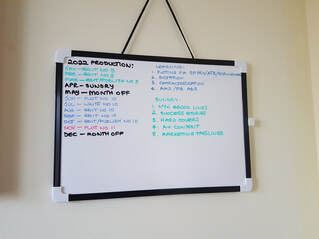 A new year is just around the corner, and as a die-hard planner I've decided on how I want my career to proceed in 2022. I've already shared on this blog how 2020 proved a difficult year for my writing, with my enthusiasm for creating fiction largely gone. While that's mostly now sorted, I don't want to push myself too hard in 2022 and risk losing my writing mojo again. With that in mind, I've created a fairly relaxed schedule that allows me time off and still publish two novels in 2022. So where am I with my ninth novel? The answer is that it's well under way, with 23,000 words done. The plan is to complete the first draft by the end of 2021, ready to start editing in January 2022 and publish the book in March. That gives me enough time to plan, write, edit and publish my tenth novel by the end of 2022, while also working on sundry other projects such as getting some of my novels into hardback format. I also aim to streamline my process and make it more efficient by using speech to text software, which is far quicker and more accurate than my ham-fisted typing. A snail could type quicker than me and probably make a better job of it! I've also bought timeline software that should help during the planning phase of my novels. I didn't achieve as much as I wanted in 2021, but I did release 'She'll Never Tell' in August and my second box set, 'Shadows of the Mind 2', a month later, which is far more than I managed in 2020. I'm cautiously optimistic about 2022 - bring it on! 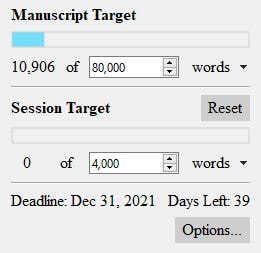 On January 5, 2021, I posted my writing goal for the year, which was to publish two novels. My eighth full-length title, She'll Never Tell, was released on August 31, 2021, and I soon realised that planning, writing, editing and publishing another before the end of 2021 wasn't going to happen. My solution? I decided to release a novella instead, figuring that 30,000 words was doable even if 80,000 wasn't. Life, however, proceeded to throw me a curve ball or two, and it soon became apparent that getting a novella out by December 31 wasn't feasible either. That's not such a bad thing - apart from my reader magnet, Blackwater Lake, I write longer fiction, which is my preference. With that in mind, and with my 2021 writing goals blown anyway, I decided to grow my novella into a full-length novel. I'm now almost 11,000 words into the book, and I'm busy working on the additional plot elements. It's been great fun throwing all kinds of wicked stuff at my hapless characters! I'll post in more depth later about the storyline, but it involves a dark obsession based around a heart transplant! My aim is to plot the novel during November and write it during December, using speech to text software to speed things up. If all goes well, the novel should be released next spring. Fingers crossed! I'm delighted to say that my eighth novel, She'll Never Tell, has now been published in kindle format via Amazon. The paperback version will follow shortly. The book has been getting great reviews so far! Here are a selection: LC - There are red herrings everywhere, and I pride myself on spotting these, but not this time. There are so many revelations that I didn’t expect, include a couple of massive ones near the end of the book. This really was an excellent example of a psychological thriller and I read it in one day. I had to know! A fast paced read full of suspense and ⭐️⭐️⭐️⭐️⭐️ NM - Wow!! What a very clever concept and one perfectly executed. Skillfully constructed and a plot that comes alive putting the pieces of the puzzle together. A highly recommended read. DD: If you like well-drawn characters, a twisting plot & several unexpected turns of events, then this is the book for you. Highly recommended. LH - I loved it… - that ending!! Wow! As you can imagine, I'm delighted by such great feedback. If you'd like to check out She'll Never Tell, then the Amazon link is in the button below. Two women. One secret. How many lies?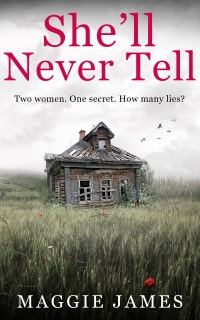 The sudden death of her mother shatters Olivia Gilchrist’s world. Grief turns to shock when a post-mortem reveals Sonia has lied to her daughter in the cruellest possible way. Angry and hurt, Olivia vows to uncover the truth. Meanwhile, Olivia’s neighbour, Elena, harbours a dark secret. Now the past has caught up with her, forcing Elena to go into hiding. Olivia soon discovers Elena was involved in Sonia’s deceit. She has questions she’s desperate to ask her former neighbour. Olivia suspects, however, that Elena is warped and unstable. Tracking her down may be difficult and dangerous. The temptation proves too strong, and a game of cat and mouse with a vengeful woman ensues. One that has the potential to turn deadly… A gripping novel of psychological suspense, She'll Never Tell is the story of a decades-old secret that refuses to stay hidden. Overview of '11.22.63' 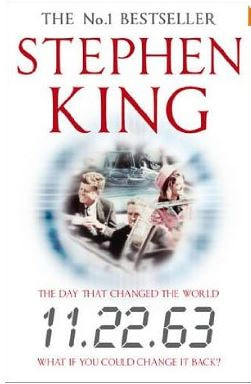 Stephen King is often referred to as "the master storyteller" and for me this is never been more evident than in his epic novel 11.22.63. An lengthy 734 pages long, the book examines the "butterfly effect” that results when one man tries to change the past. To quote from the back narrative: ‘In 2011, Jake Epping, an English teacher from Lisbon Falls, Maine, sets out on an insane – and insanely possible – mission to prevent the Kennedy assassination. Leaving behind a world of computers and mobile phones, he goes back to a time of big American cars and diners, of Lindy Hopping, the sound of Elvis and the taste of root beer. In this haunting world, Jake falls in love with Sadie, a beautiful high school librarian. And, as the ominous date 11.22.63 approaches, he encounters a troubled loner named Lee Harvey Oswald.’ Into his portrait of the Kennedy era, King weaves the love story of Jake, now known as George, and Sadie, one that never becomes overly treacly but instead is detailed with humour and realism. In 11.22.63, Jake travels the classic hero’s journey, from a jaded high school teacher, bruised from his divorce from his alcoholic wife, to a man who discovers the love of his life and the courage to do what hurts in order to put right the problems he’s caused. Rich details of 1950s and 1960s American life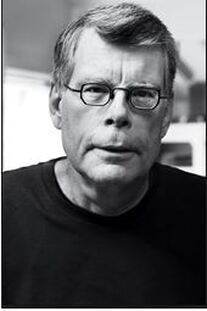 Novelist Stephen King Novelist Stephen King King is a master at evoking small-town America from the 50s and 60s. We are treated to a rich portrayal of a past life; from Jake's first taste of homemade root beer, through the music and dances of the era (Glenn Miller’s ‘In The Mood’, lindy hopping), to the cars (Jake's beloved Sunliner). In contrast to this nostalgic idyll, King also gives us the downside - prevalent domestic violence, racial prejudice, the fug of ever-present cigarette smoke. Idyll and anti-idyll are set against the backdrop of the Cold War and the bogeyman figure of Nikita Khrushchev. Besides the darkness, King provides plenty of lighter moments in the book – absurdly quaint slogans (Drink Cheer-Up Coffee!) and sidesteps such as the fun of George teaching Ritchie and Bevvie how to lindy hop. The humour is more evident in the first half of the novel, before the narrative takes a dark downward twist in the months leading up to Lee Harvey Oswald's attack on Kennedy. The richness of detail is amazing, like tracing the path of a fractal. The blood and sweat of King’s depiction of the prize fight between Case and Tiger. The shat-HOOSH sound of the machines at Worumbo Mills and Weaving. The taste of the root beer and ribs. At times, the narrative is so evocative I felt I was deep inside the novel, embedded in the heart of 1960s America. Remember the butterfly effect...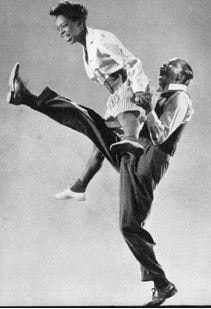 The lindy hop The lindy hop Ah, let's not forget we're not supposed to tinker with time. What about the butterfly effect? King provides plenty of hints about the impact George's presence in the past is having, and it's not always a beneficial one. Take what happens to Vince Knowles; the changing colour of the Yellow Card Man's card; the subtle differences in the conversations George has every time he returns to September 9, 1958. This is no Groundhog Day – instead of opportunities to improve his situation, King provides George with more and more chances to screw up the future by messing with the past. As Al Templeton tells him: "The past is obdurate. Doesn't want to be changed". It’s no coincidence that the entrance to the rabbit hole into 1950s Lisbon Falls is chained off, posing as a broken sewer pipe. A metaphor for George’s sullying of the world’s future by meddling with forces he doesn’t understand. A salutary lesson for all of us (not that any of us are likely to go time travelling any time soon!) High tension, moving towards a perfect ending...Throughout the narrative, the foreboding figure of the Yellow Card Man, a foul-mouthed wino, stands guard over the mysterious portal from Jake’s present day life into 1950s America. It is late in the novel before the Yellow Card Man’s secret is revealed, along with his instrumental role in safeguarding the future of the world. The tension mounts as the past becomes ever more obdurate in its attempts to thwart George’s interference in the Kennedy assassination. Will he succeed or won’t he? As we discover the answer, King sweeps us along to the novel’s ending, which for me was perfect. Very moving.
Why genre fiction is overlooked when it comes to the major literary prizes, when it can produce novels of this calibre, is beyond me. I highly recommend this book. Drum roll, please! My eighth novel, She'll Never Tell, is now available for preorder in kindle format from Amazon. Publication date is August 31. The paperback version will be released soon after. Here's the link: She'll Never Tell.
The sudden death of her mother shatters Olivia Gilchrist’s world. Grief turns to shock when a post-mortem reveals Sonia has lied to her daughter in the cruellest possible way. Angry and hurt, Olivia vows to uncover the truth. Meanwhile, Olivia’s neighbour, Elena, harbours a dark secret. Now the past has caught up with her, forcing Elena to go into hiding. Then Olivia discovers Elena knows what Sonia did thirty years ago. She has questions she’s desperate to ask her former neighbour. Olivia suspects, however, that Elena is warped and unstable. Tracking her down may be difficult and dangerous. The temptation proves too strong, though. A game of cat and mouse with a vengeful woman ensues. One that has the potential to turn deadly… A gripping novel of psychological suspense, 'She'll Never Tell' is the story of a decades-old secret that refuses to stay hidden. At the start of 2021 I posted about my writing plans for the year. (You can read about them here: My writing plans for 2021). I'm delighted to report that I'm still on track. My desire to write has returned full-force and I'm keen to make up for lost time!
So where am I regarding my goals? Well, my eighth novel will go to my editor at the end of June. For this book, I'm working with a new editor, and I'm keen to discover how she'll view my writing. I'm sure to learn something new! My aim is to publish this novel (still without a title - I find titles hard!) in August 2021. As regards future books, today I'll start plotting my ninth novel. If all goes according to plan, this one will be released in December 2021. I have no idea at present what the theme or plot of the book will be, so anything could happen! One thing's for certain - my lead characters will get a bumpy ride... I'll keep you posted! Thanks for reading.  After such a stressful 2020, I 'm relieved we're in 2021! Yes, I know the covid-19 infection takes no notice of dates, but there's something about a new year that always inspires me. I love setting goals for myself, yet I achieved little on the writing front in 2020. For much of the year my enthusiasm for writing novels evaporated, and I questioned whether to continue with my author career. That struggle is still with me to some extent, but I've made significant strides in conquering my demons. From talking to my author friends, it seems disillusionment is an occupational hazard! Onwards into 2021! One thing I'm clear on - I'm keen not to overstretch myself this year. I've read social media posts from authors who publish a book a month; just the thought exhausts me. I want balance in my life, not burnout. Besides writing, I have other priorities in my life, such as health and fitness, improving my spoken Spanish and learning to paint abstract acrylics. Writing is hugely important, but not at the detriment of my other goals. With that in mind, I've set myself modest and very achievable targets for 2021. My aim is to publish my eighth novel, currently in first draft format, and write and publish my ninth novel. That's two releases in one year, much better than 2020, which was a zero-release year. It's a far cry from joining the book-a-month brigade, but I'm comfortable with that. Wish me luck! December 1 marks a very special anniversary for me! As of December 1, 2020, I've been a full-time novelist for six years! It's been a rollercoaster ride in many ways, but I have no regrets. I've blogged before about my first five years (see post here), so I won't go over old ground. 2020 has been a challenging year for my writing, with no books published and a distinct lack of mojo on my part. I'm working hard to get back on track, with my eighth novel now completed in draft, and I've started plotting number nine. I've never regretted my decision to go full-time, although writing can be a very isolating profession, and one that has various pitfalls. I'm fulfilling my childhood dream, however, and I love that I can combine writing with my love of travel. So long as I have a laptop and an internet connection, I'm good to go! My plans for 2021... I love setting myself goals! As we approach the end of 2020, I'm already considering what I want to achieve in 2021. I've no plans to change genres - I enjoy writing psychological suspense novels, so that's what I'll continue to do. Ideally I'd like to publish two books a year, one every six months. My process isn't as quick or efficient as it should be, however - editing takes me forever! - and I suspect a novel every eight or nine months is more realistic. We shall see.
Other goals? I aim to grow my email list and Facebook readers' group, and market my books better. Most importantly, I want to recapture my love of writing, which has been sadly absent for much of 2020. 2021 needs to be about FUN on the creative front! Whatever happens, I'm very grateful to my readers for their support and encouragement. Thanks to each and every one of you! During my writing career I've come across readers who say they hate prologues. This baffles me, because they're part of the story - why dislike them, if the novel is a good read? As an author, I believe prologues fulfil several useful roles, and I've used them in my books when appropriate. Let's examine why prologues can enhance a novel. Uses of prologues: 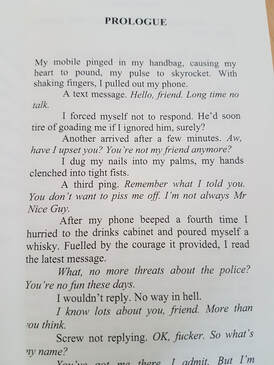 The prologue from my novel 'Deception Wears Many Faces'. The prologue from my novel 'Deception Wears Many Faces'.
So why do people dislike prologues? |
Categories
All
Subscribe to my blog!
Via Goodreads
|
Join my Special Readers' group and receive a free copy of 'Blackwater Lake'!
|
Privacy policy Website terms and conditions of use
Copyright Maggie James 2018 - current date. All rights reserved.
Copyright Maggie James 2018 - current date. All rights reserved.
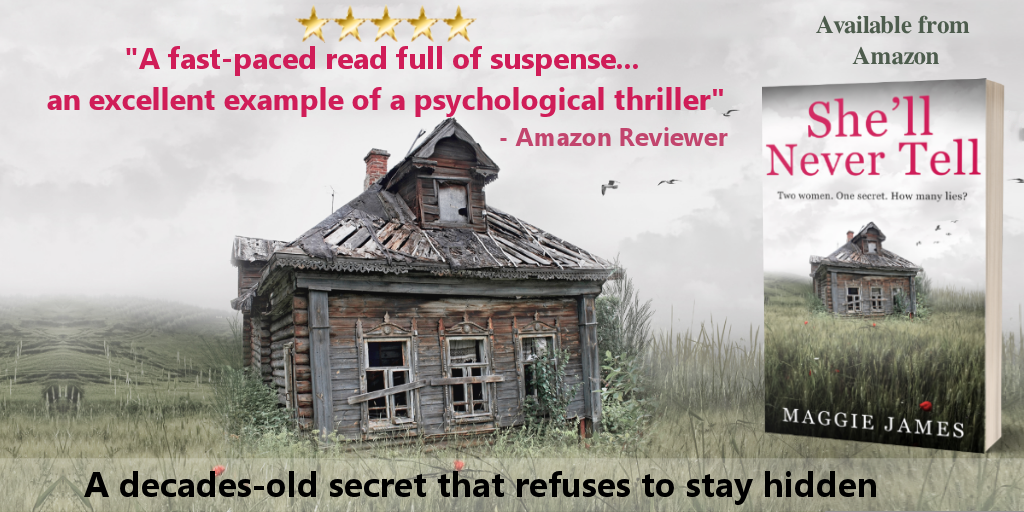
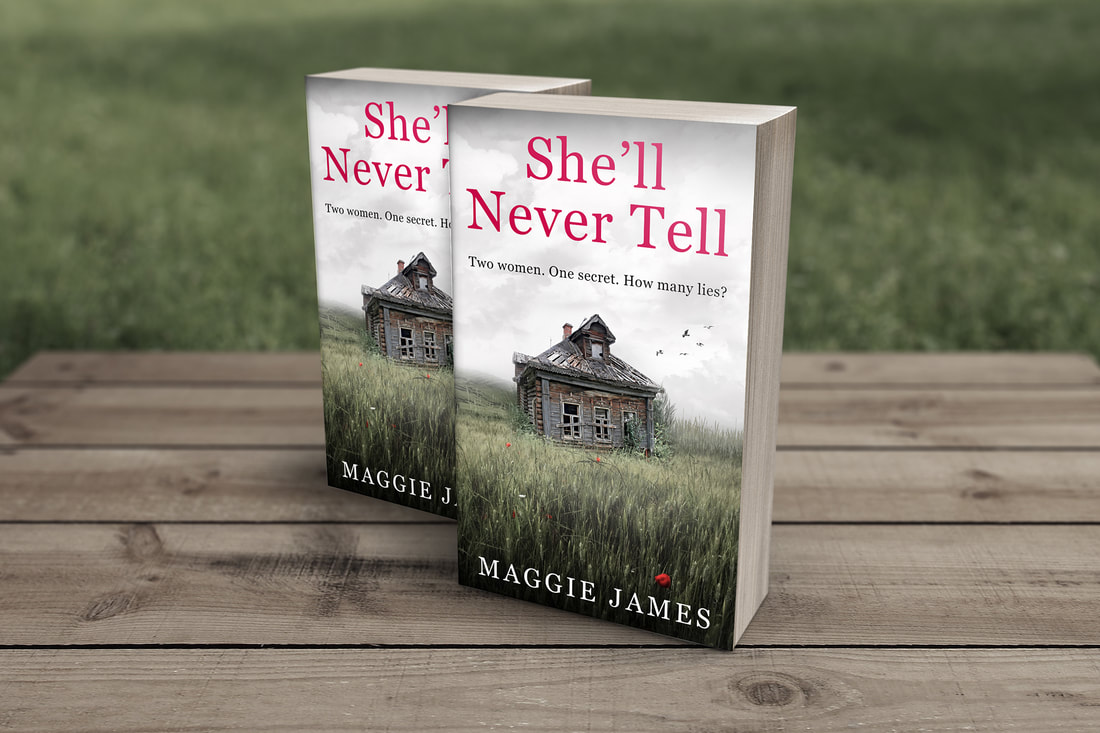


 RSS Feed
RSS Feed
